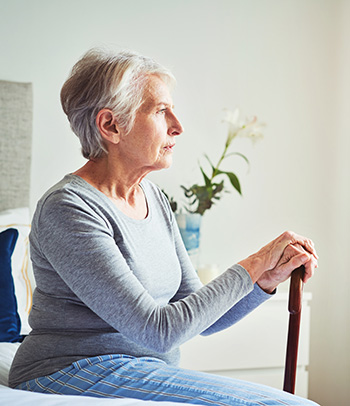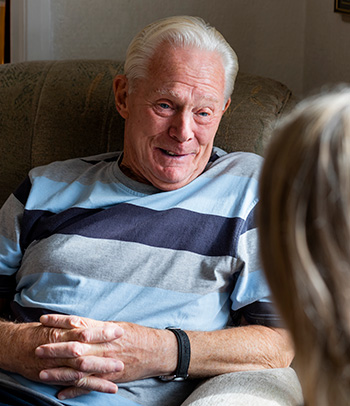As we age, our bodies and minds continue to change. We may find it harder to do certain physical activities, we discover new aches and pains or maybe it takes longer to remember someone’s name or an important date. These are normal signs of aging. However, certain changes in the brain, that are not related to normal aging, may be the beginning of Alzheimer’s disease.
If you or someone you love has been diagnosed with Alzheimer’s disease, get connected to the services and support you deserve.
The Department of Veterans Affairs (VA) offers information, tools and health care services to help families dealing with an Alzheimer’s diagnosis. Learn more about the disease, its warning signs, what to do after a diagnosis and where to turn for support.
What Is Alzheimer’s Disease?
Alzheimer’s is a progressive disease that destroys brain cells and affects a person’s memory, thoughts and behavior. According to the Centers for Disease Control and Prevention (CDC), an estimated 5.7 million Americans have Alzheimer’s Disease. Alzheimer’s is not a normal part of aging—symptoms eventually grow severe enough to interfere with daily tasks and activities.
What Are the Warning Signs?
 Memory problems are typically one of the first warning signs. In addition, other warning signs may include:
Memory problems are typically one of the first warning signs. In addition, other warning signs may include:
- Trouble handling money or paying bills
- Getting lost in a familiar place or repeating questions
- Misplacing things or being unable to retrace steps to find them
- Difficulty completing familiar tasks at home or work
- Decreased or poor judgment
- Changes in mood, personality or behavior
Even if you or someone you know has several or most of these signs, it doesn’t always mean it’s Alzheimer’s disease. It is important to talk to your health care provider to make an accurate diagnosis. Several things can cause symptoms that mimic Alzheimer’s disease, such as depression, certain medicines, heart or lung disease and more. Learn more about these reversible dementias and discuss them with your health care provider.
What Happens After Diagnosis?
Early diagnosis can provide an opportunity for you and your family to make a plan and consider important topics such as financial planning, advance directives, care needs and much more. VA’s Health Library offers several resources to help families plan for life after an Alzheimer’s diagnosis.
- Safety checklists offer concrete ways to create a safe home, prevent falls, manage driving concerns and much more.
- Legal and financial planning information includes tips on dealing with issues such as power of attorney, living trusts, wills and much more.
- Advance care planning provides information on the process of making choices about your future medical care, including creating an advance directive.
- Caring for Dementia offers tips for caregivers on how to build support networks, communicate effectively, arrange for care and much more.
In addition, the CDC offers several podcasts and videos related to Alzheimer’s disease, caregiving and much more that you may find useful as you navigate a new diagnosis.
What Services and Benefits Are Available Through VA?
 Currently, many people living with Alzheimer’s disease are cared for at home by family members. Caregiving can be rewarding and create strong family bonds; however, caregiving can also be difficult and overwhelming at times. Caregiver support is essential for coping with an Alzheimer’s diagnosis. The dementia care services offered by VA, include a full range of health care services to benefit both the caregiver and person living with Alzheimer’s. Depending on you and your family’s needs, services may include:
Currently, many people living with Alzheimer’s disease are cared for at home by family members. Caregiving can be rewarding and create strong family bonds; however, caregiving can also be difficult and overwhelming at times. Caregiver support is essential for coping with an Alzheimer’s diagnosis. The dementia care services offered by VA, include a full range of health care services to benefit both the caregiver and person living with Alzheimer’s. Depending on you and your family’s needs, services may include:
- Home Based Primary Care – Health care services provided by a health care team to Veterans at home for complex health care needs or ongoing illnesses.
- Homemaker and Home Health Aide – A trained person who can come to a Veteran’s home and help the Veteran with daily activities and care.
- Respite Care – A program that pays for care for a short time when family caregivers need a break, to run errands or to go out of town for a few days. This can be provided at home, at an adult day health care program or a nursing home.
- Adult Day Health Care – A program Veterans can go to during the day for social activities, peer support, companionship and recreation. It can provide respite care to family caregivers, help Veterans gain skills and get assistance with daily living activities such as help with bathing, dressing or fixing meals.
- Residential Settings and Nursing Homes – Adult family homes, assisted living centers, VA nursing homes, community nursing homes and more where Veterans can live full time and receive skilled nursing care day and night.
- Palliative Care – Comfort care with a focus on relieving suffering and controlling symptoms so that Veterans can carry out day-to-day activities and continue to do what is most important.
- Hospice Care – Comfort care provided to you and your family if you have a terminal condition, with less than six months left to live and are no longer seeking treatment.
- VA’s Caregiver Support Program – Support, resources, education and services for family caregivers including peer support mentoring, skills training, telephone support and more.
Services at home and in the community are part of your VA medical benefits package. Find out if you’re eligible and learn how to apply by visiting VA’s page on health care benefits or call 877-222-8387.
If you or someone you love has been diagnosed with Alzheimer’s disease, get connected to the services and support you deserve.







